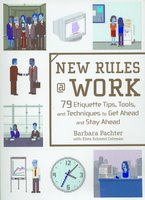Tough times at work? Tips for keeping your cool when confronted by a hothead colleague

Are times tough at work? It will suffice to say they are for those of us who work in newspapers. Doing more with less is pretty much our motto. (That would be an understatement).
Below is a column from regional business etiquette pro and author Barbara Pachter. I'm a fan of hers, and not only because she sends me clean press releases.
6 Ways To Be Verbally Graceful During Tough Times At Work
Budgets have been cut, people are being asked to do more with less and many employees are worried about losing their jobs. As a result, people are stressed in today’s workplace and can easily lose their cool when difficulty arises.
“The important thing to remember when you are harassed or attacked by someone,” according to business etiquette expert Barbara Pachter, author of The Power of Positive Confrontation ($14.95 paperback, Marlowe & Co.), “is not to react in a way you will regret later. Though it may feel good to say, ‘Well, what do you know, you idiot?’ it’s not going to build your credibility or accomplish anything.”
But it is important to know how to respond. You don’t want to be thinking, “I should have said or done ....” It is easier to retain your composure, respond calmly and not attack back when you’re prepared.
Here are Pachter’s 6 guidelines for what to say or do when the going gets tough:
1. LET IT GO. Understanding that people are under a lot of pressure can allow you to cut the person some slack. Sometimes it can be best not to do or say anything--just listen. Many times the person will come back later and apologize for the outburst.
2. AGREE WITH THE COMMENT. A good defense is the best offense. You can agree with what the person said but add additional information that turns the comment around, such as, “You’re right. We did put a lot of people on this project because it’s important to get this information out to our customers at this time.”
3. ASK FOR CLARIFICATION. Ask questions or make comments to get more information: “Why are you saying that?” “Help me to understand what you mean by . . . .” “Tell me more about your concern.” “Are you saying it was . . . ?” Probing makes you less likely to appear wounded by the attack, and it also buys you some time to calm down and collect your thoughts.
4. ACKNOWLEDGE WHAT YOU HAVE HEARD. First acknowledge what was said: “I understand your frustration,” or “I hear what you are saying.” Then use the word and, not but, to provide clarifying information, because using but negates what comes before it. A defusing statement such as “There may be some truth to that, and we are looking at the numbers,” or “That’s interesting, and you may not realize that we’ve been looking at those numbers,” can also let the person know that you have heard him or her.
5. RESPECTFULLY DISAGREE. Be polite but firm. You can say, “I disagree, and here’s why…”
6. POSTPONE THE DISCUSSION. Sometimes it is best to talk to the person privately. Say something like, “You obviously have strong feelings. Let’s get together after the meeting so we can discuss this issue in more depth.”
Barbara Pachter is a speaker, trainer, coach and author of numerous business books, including When The Little Things Count…And They Always Count ($14.95, paperback, Marlowe & Co.) and NewRules @Work: 79 Etiquette Tips, Tools and Techniques to Get Ahead and Stay Ahead ($13.95, paperback, Prentice Hall). She specializes in business etiquette and communication. Pachter gives over 100 seminars a year to major organizations worldwide, including Microsoft, Pfizer, Chrysler, and Cisco Systems.
Labels: Barbara Pachter, business etiquette
 RSS
RSS




